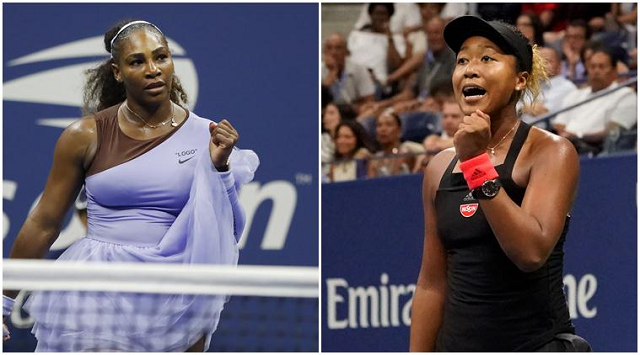Serena Williams’s claim that the code violations that sparked her meltdown in the US Open final were sexist stirred debate, with backing her on Sunday.
Williams was handed three code violations — and docked a point and then a game — in her 6-2, 6-4 loss to Naomi Osaka in the Flushing Meadows final.
Osaka out-played her childhood hero to become the first Japanese player to win a Grand Slam, but her accomplishment was swamped in the controversy surrounding 23-time Grand Slam champion Williams.
The American superstar claimed that chair umpire Carlos Ramos meted out penalties for infractions that male players could have gotten away with, specifically a violation for verbal abuse after she called him a “thief” and a “liar” for warning her for coaching from her players’ box, then docking her a point when a racquet abuse violation followed.
Eventually she was docked a game — putting Osaka on the brink of victory.
Simon said the affair brought to the forefront the question of whether different standards are applied to men and women in the officiating of matches.
“The WTA believes that there should be no difference in the standards of tolerance provided to the emotions expressed by men vs. women and is committed to working with the sport to ensure that all players are treated the same,” he said.
“We do not believe that this was done last night.”
Williams was most incensed by the first code violation she received — for coaching from her box.
It’s not clear if she even saw the hand gestures by coach Patrick Mouratoglou sitting her box, although he admitted in an interview with ESPN that he was trying to advise her — and said all coaches do it.
“Yes, I was coaching just like everybody else. We have to stop this hypocrisy. Furthermore, Serena didn’t even see my gestures. She felt humiliated by the warning,” said the Frenchman.
Simon said the sport as a whole should examine the rules on coaching, noting that the WTA already allows on-court coaching during regular tour events — if a player requests it.
US great Billie Jean King addressed both issues, also seeing things Williams’s way.
“When a woman is emotional, she’s ‘hysterical’ and she’s penalized for it,” King tweeted. “When a man does the same, he’s ‘outspoken’ & and there are no repercussions. Thank you, @serenawilliams, for calling out this double standard. More voices are needed to do the same.”
National Organization of Women president Toni Van Pelt weighed in with a statement calling for the USTA to sever any ties to Ramos for “a blatantly racist and sexist move”.
Williams’s pleas to referee Brian Earley and a Grand Slam supervisor — called to the court after she failed to get satisfaction from Ramos — were to no avail.
The USTA said in a statement after the match that the decision to hand out the final code violation and game penalty was “not reviewable”.
“Because I’m a woman you’re going to do this to me,” she fumed on court and after the match Williams didn’t walk back that charge.
“I’ve seen other men call other umpires several things,” she said. “I’m here fighting for women’s rights and for women’s equality and for all kinds of stuff.”
Men’s champion Novak Djokovic treaded warily when asked to weigh in on matter.
Djokovic noted that it was an “awkward situation” for both competitors and “tough” for the umpire.
“I have my personal opinion that maybe the chair umpire should not have pushed Serena to the limit, especially in a Grand Slam final,” he said.
“He did change the course of the match. It was, in my opinion, maybe unnecessary. We all go through our emotions, especially when you’re fighting for a Grand Slam trophy.
However, he said he wasn’t sure sexism was at the root of Ramos’s decisions.
“It’s hard to generalize things,” he said.












